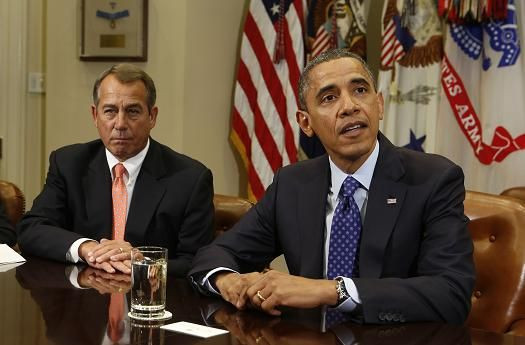Obama Campaigns With CEOs On Fiscal Cliff As Boehner Asks To Sit And Talk

Refusing to budge on his stance for a tax hike on wealthiest Americans, President Barack Obama on Wednesday continued campaigning to apply pressure on Republicans to adopt that view in a plan to avert the “fiscal cliff.”
Obama is meeting with corporate executives at the annual Business Roundtable conference in Washington, where sources told the media the President will make the case for a tax cut extension for the middle class and explain why no agreement can hurt businesses.
“He will also highlight that any plan must include balance and that is why he has put forward a detailed, comprehensive plan that specifies how he would raise revenue from the wealthiest, curb spending, and reform entitlements, and he will reiterate that he will not accept a deal that doesn’t include higher rates on the wealthiest individuals,” a White House official told Politico.
The White House and Republican lawmakers have 26 days to agree on a fiscal cliff plan before deep spending cuts accompany a tax increase for all in January.
In response to Obama’s $1.6 trillion plan, House Speaker John Boehner has proposed a $2 trillion offer that includes $800 billion in new revenue from closing unspecified tax loopholes. However, Obama has refused to look at any proposal that doesn’t seek new revenue from the nation’s top 2 percent of earners. The President has said there will be no deal without it.
In a closed-door meeting Wednesday morning, Boehner said that, without accepting the GOP’s counterproposal, the onus is on Obama to put a plan on the table that can pass both chambers, according to Politico.
House Republicans are also demanding a meeting with Obama to push things forward, days after Boehner said “no substantive progress” has been made.
“Nothing is going on,” House Majority Leader Eric Cantor told reporters regarding the talks. “We ask the president to sit down with us.”
Boehner said he will be available at “any moment” for the sitdown. But in his first interview since re-election, Obama told Bloomberg TV on Tuesday that the issue is not about his not being in a room with Boehner. It is Republicans’ refusal to acknowledge that revenues must be raised to balance out the cuts to be made.
While the talks are stalled, governors from both sides agree that lawmakers must avoid the fiscal cliff. Experts have said with no agreement, the U.S. could experience another recession and a higher unemployment rate in 2013.
The group of governors went to Washington on Tuesday and pleaded for consensus to prevent negative impact on their states, according to the Washington Post.
The federal government provides some revenue to states, helping with education, health and other social programs. A cut in government spending means a reduction in funding for these programs.
Of particular concern is Virginia, where the huge military presence could be affected by steep defense cuts. The state’s legislature has a $30 million contingency fund to protect against federal reductions, the Post reported. Moreover, the governor directed agencies to make a 4 percent budget cut across the board as a precaution during this period of uncertainty.
© Copyright IBTimes 2024. All rights reserved.






















